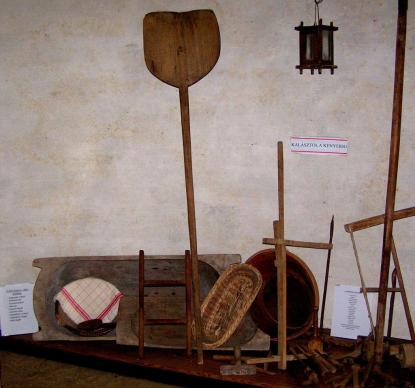2025. January 14. Tuesday
Dorozsma Windmill - Szeged - Kiskundorozsma
 |
Address: 6791, Szeged - Kiskundorozsma Szélmalom u. 2/A
Phone number: (62) 463-112, (20) 954-2124
E-mail: szelmolnar51@freemail.hu
Opening hours: 01.03-30.10.: Tue-Sun 14-18
|
Museum tickets, service costs:
|
Ticket for adults
|
150 HUF
|
|
|
Group ticket for adults
(over 10 people)
|
100 HUF
|
|
|
Ticket for students
|
100 HUF
|
|
|
Ticket for pensioners
|
100 HUF
|
Before the 'great water', in other words the great flood on the River Tisza in 1879, beehive ovens were essential part of every house in Dorozsma. At homesteads, villages, even in market towns bread was baked day after day in these ovens usually performed by the housewife or the oldest daughter.

Baking bread lasted up to 16-18 hours, but then usually 6-8 breads of 4-5 kg were baked. This amount usually lasted two weeks.
Instead of yeast, a material gained from the flower of hop was used after drying it in small balls.
The ferment was left for the night in wooden shells somewhere warm. At dawn, the housewife kneaded the dough and heated up the oven. First she took out of the spare ember, then, cleaned the bottom of the oven. The dough was put into form and then placed into the oven. It took about two hours for the bread to bake, but at around half time, the housewife took a look, she blessed the bread.
The remaining dough was good for a little scone that the children loved.

Baking bread lasted up to 16-18 hours, but then usually 6-8 breads of 4-5 kg were baked. This amount usually lasted two weeks.
Instead of yeast, a material gained from the flower of hop was used after drying it in small balls.
The ferment was left for the night in wooden shells somewhere warm. At dawn, the housewife kneaded the dough and heated up the oven. First she took out of the spare ember, then, cleaned the bottom of the oven. The dough was put into form and then placed into the oven. It took about two hours for the bread to bake, but at around half time, the housewife took a look, she blessed the bread.
The remaining dough was good for a little scone that the children loved.
